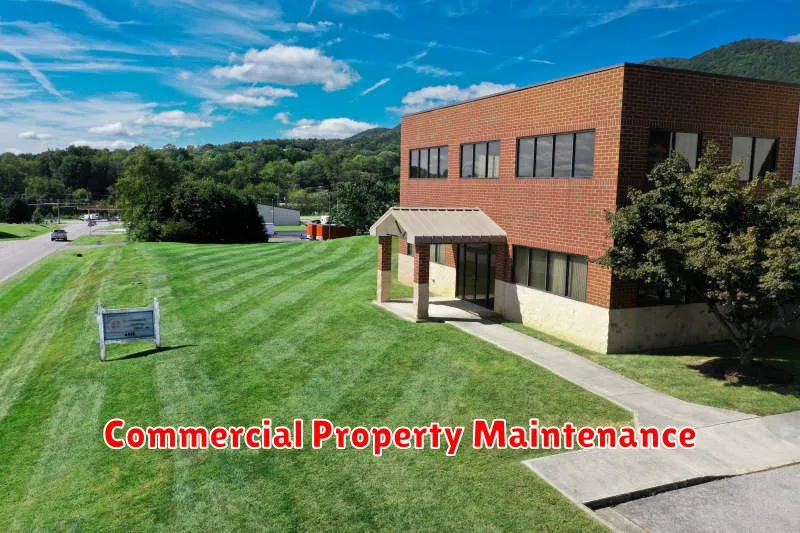Owning a commercial property is a big responsibility. It requires a lot of time, effort, and money to keep it in good condition. And if you don’t take care of it properly, you could end up with costly repairs down the road. That’s where a good building maintenance program comes in. A comprehensive maintenance plan can help you keep your property looking its best and avoid costly repairs.
This ultimate guide to building maintenance for commercial properties will cover everything you need to know, from developing a maintenance plan to finding the right contractors. Whether you’re a seasoned property owner or a first-time buyer, this guide will equip you with the knowledge and tools to ensure your property is well-maintained and in top condition for years to come.
Essential Building Systems to Maintain
Maintaining your commercial property is a crucial task that involves ensuring the safety and functionality of your building. By implementing a robust maintenance strategy, you can minimize unexpected repairs, extend the life of your property, and create a positive and productive environment for your tenants. While the scope of maintenance can be vast, there are some essential building systems that require particular attention to ensure their optimal performance.
HVAC systems are vital for creating a comfortable and healthy indoor environment. Regular maintenance includes checking and cleaning filters, inspecting and cleaning coils, and monitoring refrigerant levels. Electrical systems, including wiring, outlets, and lighting, also require regular attention to ensure safety and efficiency. This includes checking for frayed wires, loose connections, and overloaded circuits.
Plumbing systems are responsible for water supply, drainage, and sanitation. Maintaining plumbing includes checking for leaks, inspecting pipes for corrosion, and ensuring proper drainage function. Fire safety systems are critical for the safety of occupants and the protection of the property. Maintaining fire safety systems involves regular inspections of fire alarms, sprinkler systems, and fire extinguishers.
Roofing is essential for protecting the building from the elements. Maintaining the roof involves regular inspections for leaks, damage, and wear and tear. Lastly, structural systems such as walls, floors, and foundations require maintenance to ensure their stability and integrity. Regular inspections for cracks, settling, or other signs of damage are crucial.
By prioritizing these essential building systems and implementing a comprehensive maintenance program, you can ensure the long-term health and safety of your commercial property. This will contribute to increased tenant satisfaction, reduced operating costs, and a more valuable asset overall.
Creating a Preventative Maintenance Schedule
A well-structured preventive maintenance schedule is the cornerstone of effective commercial property management. It ensures that routine upkeep is performed regularly, preventing potential breakdowns and costly repairs. This proactive approach not only saves money but also enhances the safety and functionality of your building.
To create an effective schedule, follow these steps:
- Assess Your Property: Begin by conducting a thorough assessment of your building. Identify all critical systems and equipment, including HVAC, plumbing, electrical, fire safety, and security systems. This helps you understand what needs to be maintained.
- Establish Frequency: Determine the recommended maintenance intervals for each system and component. Consult manufacturer guidelines, industry standards, and professional recommendations. Consider factors like usage, environmental conditions, and the age of equipment.
- Define Tasks: For each system, outline specific tasks that need to be performed during maintenance. This may include cleaning, inspections, lubrication, filter replacements, or minor repairs.
- Assign Responsibility: Delegate tasks to designated personnel or contractors. Ensure clear communication of roles and responsibilities.
- Create a Schedule: Organize your tasks into a comprehensive maintenance schedule. Use a calendar or software to track upcoming maintenance activities.
- Document Everything: Maintain detailed records of all maintenance performed, including dates, tasks completed, any issues encountered, and any parts replaced. This documentation is crucial for future reference and troubleshooting.
- Regularly Review and Adjust: Periodically review your schedule and make necessary adjustments based on changing needs, equipment performance, and any new regulations.
HVAC Maintenance: Keeping Your Tenants Comfortable
A comfortable working environment is crucial for tenant satisfaction and productivity. One of the key factors in achieving this is a well-maintained HVAC system. Regular maintenance ensures optimal performance, energy efficiency, and a healthy indoor environment.
Preventive maintenance is essential for maximizing the lifespan of your HVAC system. This involves routine inspections, cleaning, and filter replacements. By addressing potential issues before they become major problems, you can prevent costly repairs and downtime.
Properly maintained HVAC systems provide consistent temperature control, ensuring your tenants stay comfortable year-round. This reduces the risk of overheating or chills, leading to increased productivity and reduced absenteeism.
Furthermore, a well-maintained HVAC system enhances air quality. Regular filter changes and cleaning remove dust, allergens, and pollutants from the air, creating a healthier environment for your tenants.
By prioritizing HVAC maintenance, you can create a positive and productive atmosphere for your tenants. This leads to increased tenant satisfaction, reduced turnover, and a more profitable commercial property.
Electrical System Upkeep and Safety Measures
A well-maintained electrical system is crucial for the safety and functionality of any commercial property. Regular inspections, repairs, and preventative measures are essential to prevent electrical hazards and ensure the smooth operation of your business.
Here are some key steps to ensure the safety and longevity of your electrical system:
- Regular Inspections: Schedule routine inspections by a qualified electrician at least annually, or more frequently if your building has heavy electrical usage. These inspections should assess the condition of wiring, outlets, switches, circuit breakers, and other electrical components.
- Preventative Maintenance: Implement a proactive maintenance plan that includes cleaning electrical panels, inspecting and tightening connections, checking for signs of wear or damage, and replacing any faulty components.
- Overload Protection: Ensure that all circuits are properly sized and protected by circuit breakers or fuses. Overloading circuits can lead to overheating, damage, and even fires.
- Ground Fault Circuit Interrupters (GFCIs): Install GFCIs in areas with water exposure, such as bathrooms, kitchens, and outdoor outlets. GFCIs are designed to quickly interrupt the flow of electricity in the event of a ground fault, preventing electric shock.
- Proper Wiring: Use only certified electricians for all wiring installations and repairs. Ensure that all wiring is properly installed, insulated, and secured to prevent short circuits, fires, and other hazards.
- Emergency Procedures: Develop a comprehensive emergency plan that outlines procedures for handling electrical emergencies, such as power outages or electrical fires. Train your staff on these procedures and ensure that they have access to appropriate safety equipment.
By following these safety measures and implementing regular electrical system upkeep, you can significantly reduce the risk of electrical hazards and ensure the safety and functionality of your commercial property. A reliable electrical system is critical to the smooth operation of your business and the well-being of your employees and visitors.
Plumbing Maintenance and Leak Prevention
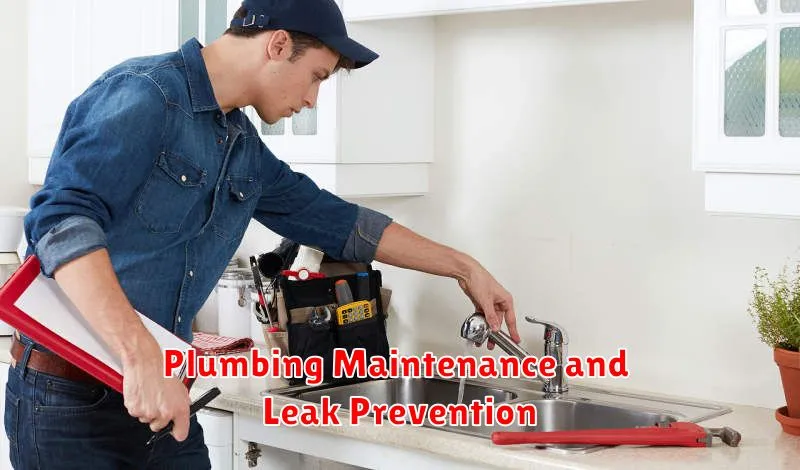
A well-maintained plumbing system is crucial for any commercial property. Regular maintenance not only prevents costly repairs but also ensures the safety and comfort of tenants and employees. One of the most significant aspects of plumbing maintenance is leak prevention. Leaks can lead to water damage, mold growth, and significant financial losses.
To prevent leaks, schedule regular inspections of all plumbing fixtures and pipes. Pay close attention to areas prone to leaks, such as under sinks, around toilets, and in the basement. Look for signs of leaks, including drips, puddles, and damp spots.
Here are some essential plumbing maintenance tips for leak prevention:
- Check faucets and fixtures for leaks: Tighten loose handles and replace worn-out washers or O-rings.
- Inspect pipes for corrosion or cracks: Repair or replace any damaged pipes immediately.
- Insulate pipes to prevent freezing: This is particularly important in cold climates.
- Flush water heaters regularly: This removes sediment that can clog pipes and reduce efficiency.
- Test backflow preventers: Ensure they are functioning properly to prevent contaminants from entering the water supply.
- Monitor water pressure: High water pressure can stress pipes and lead to leaks. Reduce pressure if necessary.
By implementing these preventive measures and scheduling regular professional inspections, you can minimize the risk of plumbing leaks and protect your commercial property from costly damage.
Roof Inspections and Repairs for Long-Term Protection
A commercial property’s roof is a critical component, providing protection from the elements and ensuring the safety and comfort of occupants. Regular roof inspections and prompt repairs are essential for long-term protection and cost savings.
Routine inspections should be scheduled at least twice a year, ideally in spring and fall. These inspections should be conducted by a qualified professional who can identify potential problems such as leaks, damaged flashing, loose shingles, and clogged gutters. Early detection and addressing these issues can prevent costly repairs and ensure the roof’s longevity.
Repairs should be addressed promptly to avoid further damage and potential safety hazards. Depending on the extent of the damage, repairs may include replacing damaged shingles, flashing, or other roof components. In some cases, a complete roof replacement may be necessary.
Investing in preventive maintenance, such as regular inspections and repairs, can significantly extend the life of your roof. This proactive approach can save you money in the long run by preventing costly repairs and ensuring the continued functionality of your commercial property.
Fire Safety Systems and Regular Inspections
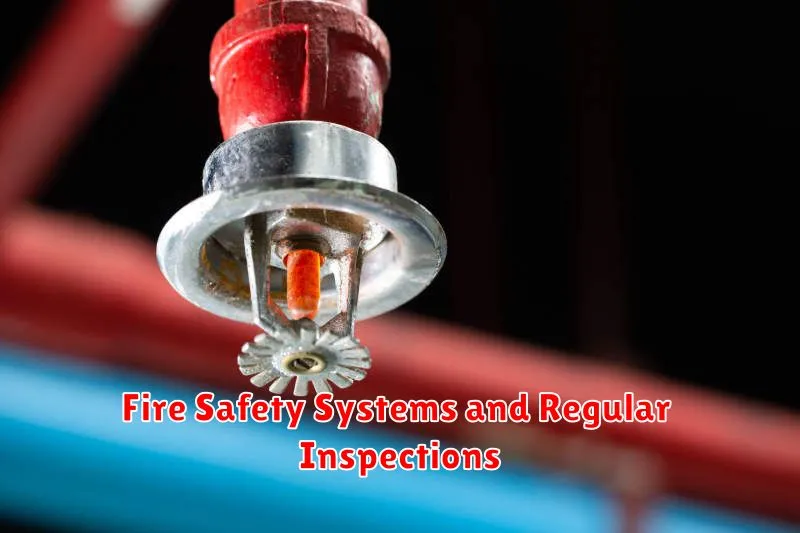
Fire safety is paramount for any commercial property, ensuring the well-being of occupants and protecting your investment. Regular inspections and maintenance of fire safety systems are essential for ensuring these systems operate effectively in an emergency.
Essential Fire Safety Systems to Inspect:
- Fire Alarm Systems: Conduct routine testing of alarms, ensuring they are audible and functioning correctly.
- Sprinkler Systems: Regularly inspect sprinkler heads, checking for blockage or damage. Annual testing is recommended.
- Fire Extinguishers: Inspect fire extinguishers for pressure, damage, and expiry dates. Ensure proper training for staff on their use.
- Emergency Lighting: Test emergency lighting regularly to guarantee it illuminates exit paths in a power outage.
- Fire Escape Routes: Regularly inspect fire escapes, ensuring clear access and that doors open easily.
Benefits of Regular Fire Safety Inspections:
- Safety for Occupants: Prompt detection and response to fires are crucial for minimizing injuries and fatalities.
- Property Protection: Fire safety systems reduce the risk of extensive damage, safeguarding your valuable assets.
- Compliance with Regulations: Regular inspections demonstrate compliance with fire safety codes, avoiding fines and penalties.
- Reduced Insurance Costs: Properly maintained systems can qualify for insurance discounts.
By prioritizing fire safety systems and regular inspections, you create a safer environment for everyone and protect your commercial property from the devastating consequences of fire.
Security System Maintenance for a Secure Environment
A robust security system is crucial for any commercial property, providing protection for both assets and people. However, a security system is only as effective as its maintenance. Regular servicing ensures optimal performance, minimizes the risk of system failures, and helps prevent security breaches.
Here are some essential aspects of security system maintenance for a secure environment:
- Regular Inspections: Schedule routine inspections by qualified technicians to assess the overall health of the system. This includes checking for wear and tear, loose connections, and potential vulnerabilities.
- Testing and Calibration: Regularly test all system components, including sensors, cameras, alarms, and access control systems. Calibration ensures accurate operation and timely responses in the event of an incident.
- Software Updates: Keep security system software up-to-date to address vulnerabilities, enhance features, and improve overall performance. Regular updates are crucial for staying ahead of potential threats.
- Battery Maintenance: Replace or recharge batteries in security system components, such as door sensors and alarms, as per manufacturer recommendations. Dead batteries can render the system ineffective during an emergency.
- Record Keeping: Maintain detailed records of all maintenance activities, including inspection dates, repairs performed, and software updates. This documentation provides a valuable reference for future troubleshooting and system optimization.
By prioritizing security system maintenance, commercial property owners can significantly enhance the safety and security of their premises. A well-maintained system provides peace of mind, protects valuable assets, and helps create a secure environment for employees and visitors.
Landscaping and Curb Appeal Enhancement
A well-maintained landscape is crucial for enhancing the curb appeal of your commercial property. First impressions matter, and a visually appealing exterior can attract customers and create a positive image for your business.
Consider these essential elements for landscaping and curb appeal enhancement:
- Regular Lawn Care: Mow the lawn regularly, fertilize, and control weeds to ensure a healthy and vibrant green space.
- Landscaping Design: Create visually appealing landscaping beds with a variety of plants, flowers, and shrubs. Choose plants that thrive in your local climate and require minimal maintenance.
- Trees and Shrubs: Strategic placement of trees and shrubs can enhance the aesthetic appeal and provide shade.
- Walkways and Patios: Ensure walkways and patios are clean, free of debris, and in good repair.
- Lighting: Proper lighting can highlight key features and improve safety at night.
- Water Features: Fountains, ponds, or even a simple birdbath can add visual interest and a calming ambiance.
- Seasonal Color: Incorporate seasonal plants and flowers to add vibrant color and texture throughout the year.
By prioritizing landscaping and curb appeal enhancement, you can create a welcoming and inviting atmosphere for customers, employees, and visitors alike.
Managing Waste and Recycling Programs
A well-managed waste and recycling program is crucial for any commercial property. It not only minimizes environmental impact but also contributes to cost savings and improves the overall image of the building. Here’s a comprehensive guide to establishing and maintaining an effective waste and recycling program:
1. Assessment and Planning:
- Analyze Current Waste Generation: Conduct a thorough audit to identify the types and quantities of waste produced. This will help determine the most effective waste management strategies.
- Set Goals: Establish specific goals for waste reduction, recycling, and composting. These goals should be measurable and achievable.
- Develop a Plan: Outline the procedures for waste collection, sorting, and disposal. This plan should address everything from designated waste containers to recycling schedules.
2. Implementing the Program:
- Provide Clear Signage: Ensure that all waste containers are clearly labeled with appropriate signage, making it easy for tenants and staff to dispose of waste correctly.
- Offer Convenient Recycling Options: Make recycling as convenient as possible by providing sufficient recycling bins in strategic locations.
- Train Staff and Tenants: Educate staff and tenants on the importance of proper waste disposal and recycling practices.
- Partner with a Waste Management Company: Collaborate with a reputable waste management company to ensure efficient waste collection, recycling, and disposal services.
3. Monitoring and Evaluation:
- Track Waste Generation: Regularly monitor waste generation data to assess the effectiveness of the program and identify areas for improvement.
- Measure Recycling Rates: Track recycling rates to gauge the program’s success and encourage further participation.
- Review and Adjust: Periodically review the waste management plan and make necessary adjustments based on data and feedback.
By implementing a comprehensive waste and recycling program, commercial property owners and managers can contribute to a more sustainable environment, save money, and enhance the overall image of their buildings.
Tenant Communication and Emergency Procedures
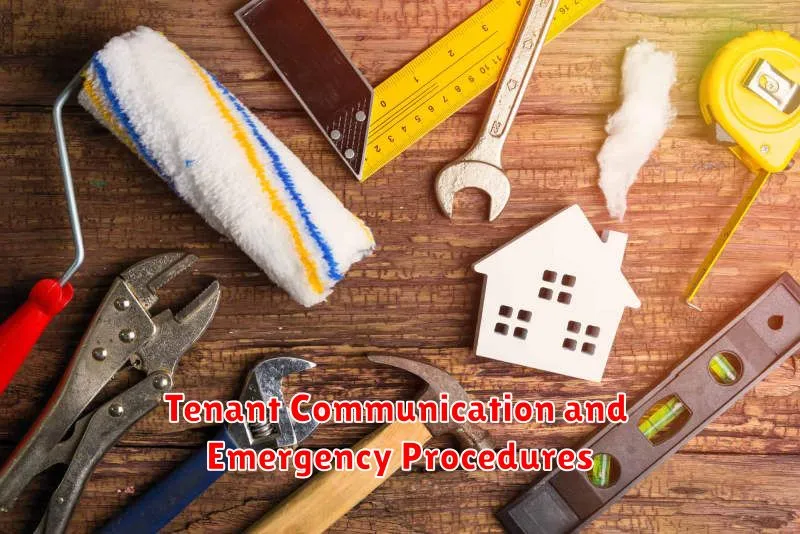
Effective communication is crucial for maintaining a positive tenant-landlord relationship. Establish clear communication channels and processes for tenant inquiries, maintenance requests, and emergency situations. A dedicated point of contact or online portal can streamline communication.
Develop a comprehensive emergency plan that outlines procedures for handling various scenarios, such as power outages, fire alarms, and security breaches. This plan should include steps for notifying tenants, coordinating with emergency responders, and ensuring the safety of everyone on the property.
Regularly communicate emergency procedures and updates to tenants. This can be done through email, newsletters, or building notices. It’s essential to test emergency procedures periodically and provide training to staff and tenants.
Tenant communication and emergency preparedness are essential for a well-managed commercial property. By establishing clear communication channels, implementing robust emergency procedures, and keeping tenants informed, you can ensure a safe and secure environment for everyone.
Budgeting for Commercial Property Maintenance
A well-maintained commercial property not only enhances its aesthetic appeal but also safeguards its value and ensures a safe and productive environment for tenants and employees. However, maintaining a commercial property can be a significant expense. This is where a robust budgeting plan comes into play. Effective budgeting for commercial property maintenance is crucial to ensure that you have the financial resources available to address all necessary repairs and upkeep while staying within your budget.
Key Components of a Commercial Property Maintenance Budget:
A comprehensive maintenance budget should encompass the following key components:
- Preventive Maintenance: Allocating funds for regular maintenance tasks such as cleaning, inspections, and minor repairs can significantly reduce the likelihood of major issues and costly repairs in the future. This includes tasks like HVAC system inspections, plumbing checks, and routine landscaping.
- Corrective Maintenance: Budgeting for unexpected repairs and breakdowns is essential. This could include replacing faulty equipment, fixing leaks, or addressing structural issues. Establishing a reserve fund for emergency repairs can help prevent unexpected financial strain.
- Capital Expenditures: Major upgrades or replacements, such as roof repairs, façade renovations, or elevator modernization, should be factored into the budget. These expenses may be spread over several years, but it’s crucial to account for them to ensure the long-term sustainability of the property.
- Contingency Fund: Unexpected events such as natural disasters, vandalism, or tenant-related damages can arise. Setting aside a contingency fund can provide financial protection for unforeseen circumstances.
Tips for Effective Budgeting:
- Historical Data Analysis: Analyze past maintenance expenses to identify recurring costs and estimate future needs.
- Professional Assessments: Consult with qualified professionals such as building inspectors, engineers, or maintenance contractors to obtain accurate estimates for repairs and upgrades.
- Regular Reviews and Adjustments: Regularly review your budget to ensure it aligns with the actual maintenance requirements of the property. Adjust the budget as needed to accommodate changing conditions or unexpected expenses.
- Prioritize Essential Tasks: Focus on addressing critical maintenance needs first, while prioritizing less urgent tasks for a later date.
- Consider Insurance Coverage: Adequate insurance coverage can help offset the cost of unexpected events, reducing the financial burden on your budget.
By implementing a well-structured budget and following these tips, you can ensure the long-term financial health and physical integrity of your commercial property while minimizing unexpected expenses and maximizing returns on your investment. Remember, preventative maintenance is key to minimizing future repair costs, and by investing in your property, you are investing in its future value and tenant satisfaction.
Choosing the Right Contractors and Vendors
When it comes to building maintenance, choosing the right contractors and vendors is crucial for ensuring the safety, functionality, and aesthetic appeal of your commercial property. It can save you time, money, and potential headaches in the long run. Here are some key factors to consider when selecting contractors and vendors:
Experience and Expertise: Look for contractors and vendors with proven track records in handling similar projects. They should have the necessary licenses, certifications, and insurance to operate legally and responsibly. Consider their experience in specific areas like plumbing, electrical work, HVAC, or landscaping. Ask for references and case studies to assess their capabilities.
Reputation and Reviews: Research their online reputation by reading reviews and testimonials from past clients. Check online platforms like Yelp, Google Reviews, and industry-specific websites to gather insights. Look for consistent positive feedback and address any negative reviews with the contractor or vendor.
Communication and Responsiveness: Effective communication is essential for a smooth and successful maintenance experience. Choose contractors and vendors who are responsive to your inquiries, provide clear estimates, and keep you informed throughout the project. They should be accessible and willing to answer your questions.
Pricing and Payment Terms: Obtain detailed quotes and compare prices from different contractors and vendors. Clarify the payment terms, including any upfront deposits, progress payments, or final payment schedules. Consider the overall value for money, including factors like quality of materials and workmanship.
Warranty and Guarantees: Inquire about warranties and guarantees offered for their services and materials. A reputable contractor or vendor will stand behind their work and provide a warranty to protect you from potential defects or issues.
Safety and Compliance: Ensure that the contractors and vendors prioritize safety and comply with all relevant building codes and regulations. They should have a safety plan in place and adhere to industry best practices.
Professionalism and Ethics: Choose contractors and vendors who demonstrate professionalism in their approach, communication, and overall conduct. Look for companies with ethical practices and a commitment to customer satisfaction.
By carefully evaluating these factors, you can make informed decisions when selecting contractors and vendors for your building maintenance needs. This proactive approach will help you ensure the long-term health, safety, and value of your commercial property.
Leveraging Technology for Efficient Building Management
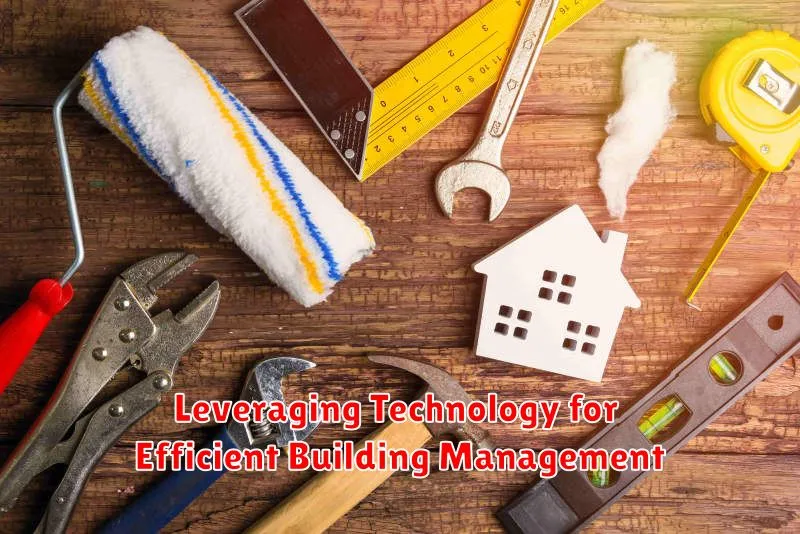
In today’s competitive commercial real estate market, efficient building management is crucial for maximizing profitability and tenant satisfaction. Fortunately, technology has emerged as a powerful tool to streamline operations, optimize resource allocation, and enhance overall building performance.
Building Management Systems (BMS) are at the forefront of technological advancement, offering centralized control over various building systems, including HVAC, lighting, security, and energy consumption. BMS can automate routine tasks, optimize energy usage, and provide real-time insights into building performance.
Internet of Things (IoT) sensors are transforming building management by providing granular data on everything from temperature and humidity to occupancy levels and asset usage. This data can be used to proactively identify maintenance needs, optimize HVAC settings, and even track equipment performance.
Cloud-based platforms offer a secure and accessible way to store and manage building data, enabling remote monitoring and control. This empowers property managers to access critical information anytime, anywhere, allowing for faster response times and informed decision-making.
Artificial Intelligence (AI) is emerging as a game-changer in building management. AI-powered systems can analyze vast amounts of data to identify patterns, predict maintenance issues, and optimize operational efficiency. AI can also personalize tenant experiences by automating tasks like booking meeting rooms or ordering supplies.
By embracing technology, building managers can unlock a world of possibilities for improving efficiency, reducing costs, and creating a more comfortable and sustainable environment for tenants.

